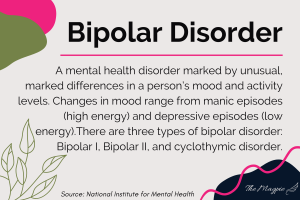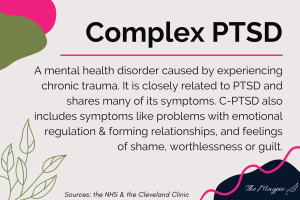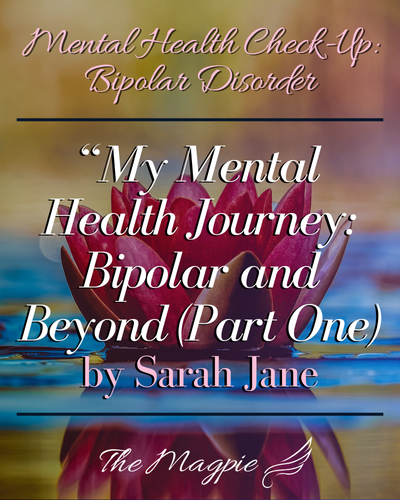
My Mental Health Journey: Bipolar and Beyond (Part One)
By Sarah Jane, Magpie contributor
Sarah Jane is a tarot reader, retreat leader, and workshop facilitator who primarily works with women, although she also works with men. She believes spirituality, in addition to more conventional therapy and recovery programs, can help those suffering from trauma to release and become more whole.
TW: discussions of depression
At first, the diagnosis was a relief.
The depressions started so early and were so insidious that by the time I was in my twenties, I was desperate for an answer. When I finally got one, I clung to it until it no longer defined me.
But it was a long road to recovery, one that I’m still walking.
How did I get to this point? My childhood was at times wonderful and at times excruciating. I had lemony sunlit days at the beach, the love of my parents, and white Christmases with presents that took weeks to unwrap.
But I also remember being 6 years old, staring into a mirror, and wondering if I even existed. I had an older sister who was volatile and unpredictable, and I have fleeting memories of being assaulted by a family friend. So, it makes sense that the depression took root so early.
By the time I was 10, I was spending days in bed: anxious, depressed, almost immobile.
Puberty did me no favors. The hormones brought wild mood swings and weight gain. By the time I was in high school, I was dealing with Complex Post Traumatic Stress Disorder (C-PTSD), brought about by more sexual assaults and prolonged bullying. I found solace in drugs and alcohol and stumbled into abusive relationships, which did nothing but assist the dark thoughts taking over.

The depressions started lasting longer. I would have brief periods of relief in high school, but I was predominantly miserable. I only graduated because I had some teachers who invested time and care in me.
College brought more PTSD and heavier drinking. It also brought on the first bouts of hypomania, times when I would buzz and talk incessantly and feel as if I was a little bit invincible. I would harness these invigorating weeks of energy to get work done, only to fall farther down each time they ended — back to drinking, back to bed.
I hit a bottom at age 23. After going through two painful relationships after college, I started having suicidal ideation. I went from living with my best friends in an old rowhouse in the city to watching as they all left the country for graduate school, leaving me alone to stumble into what became the worst relationship of my life.
I was always churning. I fluctuated between depression, hypomania, horrific anxiety and panic attacks, interspersed with brief moments of relief.
My boyfriend was both controlling and distant. Every time he pulled away, I thought that my life was going to end, and he pulled away frequently.
I started therapy. It was not my first time; I had tried it on and off for years with varying degrees of success. The only small problem this time was that I was dishonest, protecting both my relationship and my alcoholism. I told my well-meaning therapist about a third of what was going on. I had no control over my emotions, my drinking, or my pain. I was quickly heading toward disaster.
One year, as winter raged, my boyfriend told me he needed to take a break, that my moods were too much for him, and that I was insane. I was floored and terrified, my codependency made me cling to him and I begged him to stay. He was resolute.
I holed up at my best friend’s apartment, and it was here that I had my first taste of full-blown mania.
Before the break-up, I went to a psychiatrist who prescribed me antidepressants. One thing the doctor failed to mention was that if a person had a predisposition to mania, antidepressants could bring on an episode. This medication sent me over the very precarious edge I had been teetering on. I remember pacing the floor of my friend’s studio apartment, wearing a groove in the carpet as I went from laughing to sobbing and back again within minutes.
My friend was, of course, worried beyond measure. She encouraged me to contact my therapist, and when I saw her, she also became worried. She told me I needed to go back to my psychiatrist as soon as possible.
When I did, he diagnosed me with bipolar disorder.
Finally. I finally had an answer to the darkness that had followed me since I was 6 – I felt as if the breath I was holding for decades finally escaped my lips.
Now all I had to do was spend the rest of my life on a twisting and winding journey of recovery. I was desperate, so I was ready. No longer was I a car seeing the road before me inches at a time, nighttime spilling out just beyond the headlights. The answer to my pain begged a thousand more questions, and I waited, salivating, for the universe to answer.
In part 2 of this article, the author discusses recovery from bipolar and the challenges it entails. Come read the rest of Sarah’s journey in July!
